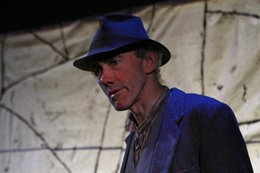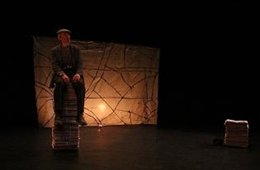The madness and magic of Tom MacIntyre’s response to The Great Hunger has become locked down tight with the theatrical history of the Patrick Kavanagh poem - Tom Hickey [in the 1983 Abbey Theatre production] creating a riot of manic energy as that play engaged in a highly physical and visual manner with the demons haunting Monaghan farmer, Patrick Maguire. Deeply rooted as that ground-breaking production is in contemporary Irish theatre, it might be better to put it far out of mind for a more low-key and gentle presentation of the poem in Cork.
 Theatre Makers Ltd. in association with the Granary Theatre present a reading/performance of the poem by actor Jack Healy. That reading/performance dichotomy is partly informed by the two main voices assumed by Kavanagh in the poem. One is the all-seeing-eye taking a cool distance from the spiritually and sexually beleaguered farmer. The other is the voice of Maguire living through actual scenes in his life. This is where the actor is offered a direct way under the skin of the lonely farmer. Healy steps with an earthy grace from the slightly detached narrative voice to the more recognisable voice of the Monaghan farmer looking for his dog – “Never where he’s wanted!”
Theatre Makers Ltd. in association with the Granary Theatre present a reading/performance of the poem by actor Jack Healy. That reading/performance dichotomy is partly informed by the two main voices assumed by Kavanagh in the poem. One is the all-seeing-eye taking a cool distance from the spiritually and sexually beleaguered farmer. The other is the voice of Maguire living through actual scenes in his life. This is where the actor is offered a direct way under the skin of the lonely farmer. Healy steps with an earthy grace from the slightly detached narrative voice to the more recognisable voice of the Monaghan farmer looking for his dog – “Never where he’s wanted!”
As Maguire he is more comfortable than when assuming the loftier narrative voice. Occasionally, Healy is a little uncomfortable sifting Kavanagh’s gravelly voice rather than making it his own. However, he ably catches the poem’s profound sense of loneliness and grows convincingly into the rhythm of the piece.
A bitter sadness of life wasted seeps from the words of the poem and yet there is a defiant humour to the work. Also defiant is the humanity that rages from its heart. In a central scene the actor sings a few stray lines of celebratory nonsense from his spot on top of a gate. But the wistful tug of this scene is that the perch only serves to give him a clearer view of the life that is draining away into the potato drills from him and the men and women around him.
 Ger FitzGibbon directs the piece with an ear for the poetic and an eye for the dramatic as the different scenes from the life of Paddy Maguire – the night at the crossroads, the lonesome nights by the fire, the burning away of physical desire, and most poignantly the slipping away of his only opportunity for the love of a girl – are effectively brought to life with the smallest of touches.
Ger FitzGibbon directs the piece with an ear for the poetic and an eye for the dramatic as the different scenes from the life of Paddy Maguire – the night at the crossroads, the lonesome nights by the fire, the burning away of physical desire, and most poignantly the slipping away of his only opportunity for the love of a girl – are effectively brought to life with the smallest of touches.
Ronan Fitzgibbon’s set design consists of a screen suggestive of a map of fields, backlit in Aoife Cahill’s evocative lighting design. Otherwise there are two stacks of newspapers, the reductive heaps in which a world of possibilities end for Maguire. The set is cleanly designed and cleverly serviceable, even if one would wish for the dirt of Monaghan clay to suggest itself. It is to the credit of performer and director that the production has, in spite of the longing and the awful sense of loss, a spring in its step.
Liam Heylin’s plays include Gdirl from Gdansk and Love, Peace & Robbery. He works as a journalist for the Irish Examiner.